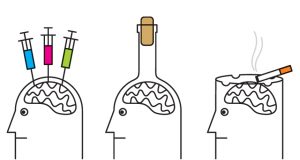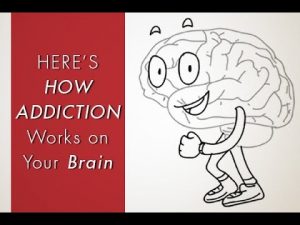What is Addiction?
Addiction is a condition that is caused by an individual using a substance or behavior for the rewarding effects that compel them to continuously repeat the activity despite it being harmful to them. Common substances that induce addictive effects include opioids, cocaine, nicotine, and alcohol, and behaviors such as gambling and video games can be addictive. These substances and behaviors have been scientifically proven to activate pathways in the brain related to reward and reinforcement, and most of them involve the neurotransmitter dopamine. Addiction also affects the brain’s executive functions, so some people who suffer from the disorder may not realize that they are harming themselves or others around them.
The cause of addiction stems from the first initial use of the substance or behavior, but there are many other factors that contribute to the continual use and eventual addiction. Genetic and biological factors contribute to the susceptibility of individuals to the condition, but social, psychological, and environmental factors have been shown to be the most powerful contributors. As many doctors like to say, with any disease, genetics loads the gun, but environment and behaviors pull the trigger.
A Link Between Stress and Addiction
There is an interesting link between stress and addiction. Stress is a known risk factor of addiction along with risk of relapse. The correlation has been assumed for decades, and has recently been proven scientifically through sophisticated human brain imaging and cross examination with other laboratory methods. These studies have shown a correlation between stress and craving and their link to the brain regions responsible for reward and addiction risk.
Stress – The Good and the Bad
Stress is a very broad term that needs some defining before we dive deeper into the link between it and addiction. Stress is defined as a process involving perception and response to a harmful or challenging event or stimulus. Stress responses are meant to be an adaptive response to regain homeostasis. Examples of stressors include loss of relationship, death of a family member, food deprivation, insomnia, and binge use of psychoactive drugs.
Stress is mostly associated with bad and harmful situations, there is also “good stress.” Good stress refers to stimuli that are moderately difficult to deal with, and if the individual handles the situation well, they generate a feeling of mastery, and are usually perceived as pleasurable. However, as intensity of the stimuli increases and is prolonged, the less control an individual has on the situation, and usually the sense of accomplishment and mastery decreases. This can increase the stress response, which as we will see, increases the susceptibility for addiction or relapse.
Three Groups at Risk

The most widely accepted and common association between stress and addiction is that drugs are used as a coping strategy to deal with stress or to self-medicate. There is sufficient evidence to this theory, and it can be categorized into three types. The first type involves adolescents experiencing negative life events such as loss of a parent, parental divorce, or a single parent family. The second type involves trauma and maltreatment, such as childhood sexual and physical abuse. The third type includes lifetime exposure to stressors and the impact is has cumulatively. These stressors are mostly unpredictable events, such as victims of gun violence, loss of parent, or natural disaster. Unsurprisingly, it has been found that the more of these uncontrollable events an individual experiences in their life, the more likely they are to become addicted to a substance or relapse, despite factors such as race, gender, or family history of drug abuse.
Brain Pathway Disfunction

Scientists have also studied neurobiological mechanisms explaining the effect stress has on addiction. Drugs of abuse such as alcohol, nicotine, and opioids all activate dopamine pathways, which is associated with higher craving. Additionally, stress exposure increases dopamine release. Because both stress and drug abuse both activate similar brain pathways, they both result in changes to neuronal synapses, enhancing the effect of each.
A Vicious Cycle
The link between stress and addiction creates a vicious cycle because they both feed into each other. The more stressed someone is, the more likely they are to abuse drugs, and drug abuse itself creates a very stressful environment for the body. They best way to avoid addiction is simply to never try drugs in the first place, but that can be easier said than done with social pressures and acceptance of drug use in pop culture. In our increasingly fast paced world, stress is tough to avoid, so staying stress and addiction free really comes down to making healthy decisions in all aspects of life.
Images:
https://www.google.com/search?safe=off&biw=1082&bih=565&tbm=isch&sa=1&ei=WXrrW-uCJY6ksAXRxqmYAw&q=stress+and+addiction&oq=stress+and+addiction&gs_l=img.3..0j0i24l4.236183.238454..238624…0.0..1.163.1953.14j6……1….1..gws-wiz-img…….0i67j0i8i30.W3_prnFKycU#imgrc=LojOaK9Nh8DJbM:
https://www.google.com/search?q=dopamine+and+addiction&safe=off&source=lnms&tbm=isch&sa=X&ved=0ahUKEwiz7e7a3dLeAhVxmK0KHY4WC-cQ_AUIFCgC&biw=1082&bih=614#imgrc=eo551pZVRyzTIM:
